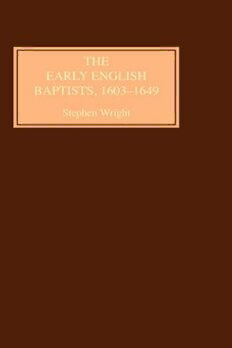
The Early English Baptists, 1603-49 PDF
289 Pages·2006·1.042 MB·English
Most books are stored in the elastic cloud where traffic is expensive. For this reason, we have a limit on daily download.
Preview The Early English Baptists, 1603-49
Description:
This book challenges the orthodoxy that seventeenth-century Baptists were divided from the first into two separate denominations, 'Particular' and 'General', defined by their differing attitudes to predestination and the atonement, showing how the position was in fact much more complicated. It describes how from the foundation of the 'Generals' in 1609 there were always two tendencies, one clericalist and pacifist, influenced by the Dutch Mennonites, and one reflecting the English traditions of erastianism and local lay predominance in religion. It re-analyses the confessional struggle during and after the civil war, showing how Independent and erastian sentiment in Parliament increasingly combined to baulk Presbyterian ambition; during and partly because of this process (which they also influenced), the Baptists evolved into three recognisable tendencies. Amongst General Baptists there was a politically radical current, but also a more passive tendency which was starting to gain ground. In 1647-9 most but by no means all Particular Baptist leaders were hostile to the Levellers. The book looks at the nature of religious conviction in the New Model Army, reassessing the role and influence of Baptists in it. In the late 40s, many Baptists, soldiers and civilians, rejected formal ordinances altogether. STEPHEN WRIGHT received his Ph.D. from the University of London. He has been visiting lecturer at the University of Hertfordshire and the University of North London.
See more
The list of books you might like
Most books are stored in the elastic cloud where traffic is expensive. For this reason, we have a limit on daily download.
